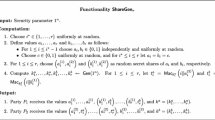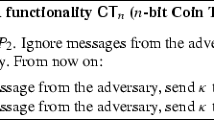Abstract
Coin-flipping protocols allow mutually distrustful parties to generate a random bit with uniform distribution. Minimizing bias and keeping fairness are two key requirements in designing such protocols. However, the best previously known fair coin-flipping protocol only guarantees with bias O(1/r). In the paper, we introduce a new approach for fair coin-flipping protocol construction by using Garay et al’s “resource fairness” technique and propose a resource-fair two-party coin-flipping protocol according to the standard real/ideal simulation paradigm. Compared with the other coin-flipping protocols, our protocol enjoys an important advantage that its bias is 0.
Similar content being viewed by others
References
Cleve R. Limits on the security of coin flips when half the processors are faulty [C]// Proceedings of the 18th Annual ACM Symposium on Theory of Computing. New York: ACM Press, 1986: 364–369.
Blum M. Coin flipping by telephone—A protocol for solving impossible problems [C]// Proceedings of the 25th IEEE Computer Society International Conference. New York: IEEE Press, 1982: 133–137.
Katz J. On achieving the “best of both worlds” in secure multiparty computation [C]// Proceedings of the 39 Annual ACM Symposium on Theory of Computing. New York: ACM Press, 2007: 11–20.
Canetti R. Security and composition of multiparty cryptographic protocols [J]. Journal of Cryptology, 2000, 13(1): 143–202.
Moran T, Naor M, Segev G. An optimally fair coin toss[C]// TCC 2009 (LNCS 5444). Heidelberg: Springer-Verlag, 2009: 1–18.
Beimel A, Omri E, Orlov I. Protocols for multiparty coin toss with dishonest majority [C]// Crypto 2010 (LNCS 6223). Heidelberg: Springer-Verlag, 2010: 538–557.
Gordon D, Katz J. Partial fairness in secure two-party computation [C]// EUROCRYPT 2010 (LNCS 6110). Heidelberg: Springer-Verlag, 2010: 157–176.
Beimel A, Lindell Y, Omri E. 1/p-Secure multiparty computation without honest majority and the best of both worlds [C]//Crypto 2011 (LNCS 6841). Heidelberg: Springer-Verlag, 2011: 277–296.
Garay J, MacKenzie P, Prabhakaran M, et al. Resource fairness and composability of cryptographic protocols [C]// TCC 2006 (LNCS 3876). Heidelberg: Springer-Verlag, 2006: 404–428.
Goldreich O. Foundations of Cryptography: Volume II—Basic Applications [M]. Cambridge: Cambridge Univ Press, 2004: 595–766.
Goldreich O, Micali S, Wigderson A. How to play any mental game-A completeness theorem for protocols with honest majority[C]//19th ACM Symposium on the Theory of Computing. New York: ACM Press, 1987: 218–229.
Chaum D, Crépeau C, Damgard I. Multiparty unconditionally secure protocols[C]//20th ACM Symposium on the Theory of Computing. New York: ACM Press, 1988: 11–19.
Pinkas B. Fair secure two-party computation [C]// EUROC-RYPT 2003 (LNCS 2656). Heidelberg: Springer-Verlag, 2003: 87–105.
Boneh D, Naor M. Timed commitments [C]// CRYPTO 2000 (LNCS 1880). Heidelberg: Springer-Verlag, 2000: 236–254.
Canetti R, Lindell Y, Ostrovsky R, et al. Universally composable two-party and multi-party secure computation [C]// 34th ACM Symposium on the Theory of Computing. New York: ACM Press, 2002: 494–503.
Garay J, Jakobsson M. Timed-Release of standard digital signatures [C]// Financial Crypto’02 (LNCS 2357). Heidelberg: Springer-Verlag, 2002: 168–182.
Cramer R, Damgard I, Nielsen J. Multiparty computation from threshold homomorphic Encryption [C]//EUROC-RYPT 2001 (LNCS 2045). Heidelberg: Springer-Verlag, 2001: 280–300.
Ruan Ou, Fu Cai, Cui Guohua. An efficient protocol for the commit-prove-fair-open functionality [DB/OL]. [2011-06-15]. http://eprint.iacr.org/2011/577.pdf.
Kiraz M S, Schoenmakers B. An efficient protocol for fair secure two-party computation [C]//CT-RSA 2008 (LNCS 4964). Heidelberg: Springer-Verlag, 2008: 88–105.
Author information
Authors and Affiliations
Corresponding author
Additional information
Foundation item: Supported by the National Natural Science Foundation of China (60903196)
Biography: RUAN Ou, male, Ph. D. candidate, research direction: cryptography & network security.
Rights and permissions
About this article
Cite this article
Ruan, O., Zhou, J., Cui, G. et al. A resource-fair protocol for two-party coin toss. Wuhan Univ. J. Nat. Sci. 18, 254–258 (2013). https://doi.org/10.1007/s11859-013-0924-x
Received:
Published:
Issue Date:
DOI: https://doi.org/10.1007/s11859-013-0924-x




